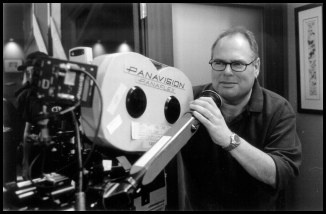Interview conducted by Cindy Klauss & Diane Hopkins, All Rights Reserved
September 10, 2002
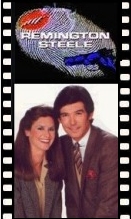 Diane: What we wanted to talk about first was where you came up with concept for the show. We know that you wrote for "Remington Steele" before you did "Moonlighting." Did the inspiration come from seeing what you could do, what you thought you could do better with a detective show, or did it come from elsewhere?
Diane: What we wanted to talk about first was where you came up with concept for the show. We know that you wrote for "Remington Steele" before you did "Moonlighting." Did the inspiration come from seeing what you could do, what you thought you could do better with a detective show, or did it come from elsewhere?
Glenn: Not consciously. I had a contract with ABC to do 3 pilots. At that time they were done as "Movies of the Week". But they were pilots of television shows. I'd already done the first two. And although I was quite proud of them, and thought they'd turned out really well, ABC chose not to put them on television and make them into series. They played them as Movies of the Week. And I'd spent a lot of money making them. And now ABC sort of came to me and said, "You spent all of this money, and you've made two of these three Movies of the Week. And neither one of them have been things that we want to make into a series, so we're going to tell you what to do for your third one." And I said, "Oh, no, don't do that. They said, "Oh, yes. We want you to do," they called it "a boy/girl detective show." And when they said boy/girl detective show, they meant a show like Hart to Hart, which was a show that was still on the air there and was very successful for them, but clearly was in its last years. It had been on for quite a while. And because I had had the experience on Remington Steele, I knew exactly what it was that they were talking about, and frankly said, "Please don't make me do that. I hate those kinds of shows. I think they're ridiculous, and I really have no feeling for it, and I have no interest in doing it." They said, "No, that's what you're going to do." We'll get a woman like Cheryl Ladd." I remember that was the name that was originally thrown out, "and some guy who can wear a tuxedo and it will be a detective show." And I said, "Really, you've got the wrong guy, I have no interest in doing that." And they said, "That's what you're doing. You can do whatever you want with it, but that's what you're doing." And all I heard was, "You can do whatever you want with it", and I sort of seized on that. Everything that followed was really me trying to stay awake, and trying to stay interested in something that I had...contempt is too strong a word, but I just felt I had seen a lot of it. I was never very interested in it. I was a big snob. And I just really didn't want to do that.
So when I sat down to write the pilot, I was really thinking, "Okay, if I have to do this, and if I have to watch this, what would interest me? What would be fun?" The thing I quickly realized is that you never, on any of these shows, you just never think that the detectives are in any real danger physically, because implicitly you know they have to be back next week. They have a television show to do. So I thought, well if I'm thinking that way, probably everyone else is thinking that way. What if they sort of acknowledge that they are on a television show? And more than that, what if we acknowledge that the only real jeopardy that exists in the television show is emotional jeopardy? That someone might care for someone else and not have their feelings returned. That, you know, it's really only matters of the heart that are of any consequence because these people clearly have to live in order for the television show to succeed. So, Moonlighting really grew out of that, out of me trying to figure out how to do that.
And the other thing that just amused the hell out of me...if you look at the television schedules in 1984 and 1985, detectives were ubiquitous. They were everywhere. And, I was always aware of the fact that I had about a 30-mile commute every day and I never passed a detective agency. Never saw one! You know, went to the mall, there were no detective agencies, but if you watched television, they were like the family doctor; they were everywhere. I thought that was sort of funny. And it really grew out of that.
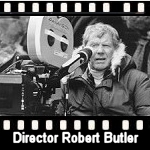 Obviously, I used some of the experience that I gained on Remington Steele. I was with Remington Steele for a very, very short time. I was there really just for the first 10 episodes. And I was there largely because I sort of made it a mission in my life to work with a guy named Bob Butler who directed the pilot for Remington Steele. And really, he sort of came up with the premise for Remington Steele. He'd been carrying it around for years. Michael Gleason developed it for television, but the original idea was actually Bob's. And I really wanted to work with Bob Butler. I got to Remington Steele, worked with Bob. At a certain point, Bob was leaving. I decided to leave. So I really wasn't there as long as a question like that would suggest, although I did contribute a tremendous amount of writing to those first 10 episodes. I think they all, if not all, then most, certainly went through my typewriter at some point. And I still am very fond of my friendship with Pierce. And we were both sort of new to television, so we, you know, he and I developed a relationship. I think I was also really the first writer over there who recognized that he could be funny. In the original conception, I don't think he was thought of as particularly funny. I think Stephanie was thought of as sort of the person who was going to lead the charge of the show, and she's a wonderful actress. But, it just became clear to me hanging around with Pierce, that he had a huge funny bone and so I really tried to write to that. Long answer to a short question."
Obviously, I used some of the experience that I gained on Remington Steele. I was with Remington Steele for a very, very short time. I was there really just for the first 10 episodes. And I was there largely because I sort of made it a mission in my life to work with a guy named Bob Butler who directed the pilot for Remington Steele. And really, he sort of came up with the premise for Remington Steele. He'd been carrying it around for years. Michael Gleason developed it for television, but the original idea was actually Bob's. And I really wanted to work with Bob Butler. I got to Remington Steele, worked with Bob. At a certain point, Bob was leaving. I decided to leave. So I really wasn't there as long as a question like that would suggest, although I did contribute a tremendous amount of writing to those first 10 episodes. I think they all, if not all, then most, certainly went through my typewriter at some point. And I still am very fond of my friendship with Pierce. And we were both sort of new to television, so we, you know, he and I developed a relationship. I think I was also really the first writer over there who recognized that he could be funny. In the original conception, I don't think he was thought of as particularly funny. I think Stephanie was thought of as sort of the person who was going to lead the charge of the show, and she's a wonderful actress. But, it just became clear to me hanging around with Pierce, that he had a huge funny bone and so I really tried to write to that. Long answer to a short question."
Diane: That's a great answer. Well, this is going to be a question that may require a long answer. Can you tell us, when you took a concept for Moonlighting and decided on an episode...can you take it from concept to airing for us? From script development to airing; or would that take the entire afternoon?
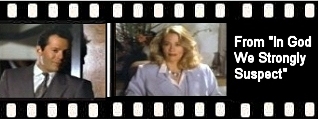 Glenn: No, no I can do that. The truth is they're all different. They all come from different places. But, the example that I often give is, I really wanted to do a show about spirituality. I had young children at the time, and I was really spending a lot of time thinking about spirituality and the whole business of faith. Where does that come from? So we would go into the writers' room and we'd talk about that. I'd say, "You know, I want to do a show about this. And I remembered thinking, "Does this have any parallels to magic?" You know, because someone who is cynical might easily say, "What's the difference really, between faith, the belief in a higher power, and the sort of belief that's required for people to enjoy magic, which is about illusion, sleight of hand, and all those kind of things. And very slowly we came up with this idea for this episode about a magician, the particulars of which I don't remember. But what I do remember very strongly is sitting and thinking for a long, long time how would Maddie and David...how does faith figure into their lives? I remember thinking at first blush, because we think of Maddie's character as being the conventional character, that she would be the religious person. And Dave, because he's sort of this wisecracking guy, he would be more cynical. And therefore, if either of them were non-believers, it would probably be David. But the more I thought about it, the more I realized that, no, I had it backwards. That for David to be David...in my eyes, David was always this cockeyed romantic, and therefore this sort of gigantic optimist. If you remember when he and Maddie met, Maddie was saying, "You know, I've got to close this place down. It's never going to make a dime." And David sort of saying, "No, no, no, no; stick with me, we can take on the world. We can make this work." You know, he's really a cockeyed optimist and therefore, in his own weird way, although clearly very much in touch with sin, I think also a very religious person and a very spiritual person, and a very fervent believer in the idea of God.
Glenn: No, no I can do that. The truth is they're all different. They all come from different places. But, the example that I often give is, I really wanted to do a show about spirituality. I had young children at the time, and I was really spending a lot of time thinking about spirituality and the whole business of faith. Where does that come from? So we would go into the writers' room and we'd talk about that. I'd say, "You know, I want to do a show about this. And I remembered thinking, "Does this have any parallels to magic?" You know, because someone who is cynical might easily say, "What's the difference really, between faith, the belief in a higher power, and the sort of belief that's required for people to enjoy magic, which is about illusion, sleight of hand, and all those kind of things. And very slowly we came up with this idea for this episode about a magician, the particulars of which I don't remember. But what I do remember very strongly is sitting and thinking for a long, long time how would Maddie and David...how does faith figure into their lives? I remember thinking at first blush, because we think of Maddie's character as being the conventional character, that she would be the religious person. And Dave, because he's sort of this wisecracking guy, he would be more cynical. And therefore, if either of them were non-believers, it would probably be David. But the more I thought about it, the more I realized that, no, I had it backwards. That for David to be David...in my eyes, David was always this cockeyed romantic, and therefore this sort of gigantic optimist. If you remember when he and Maddie met, Maddie was saying, "You know, I've got to close this place down. It's never going to make a dime." And David sort of saying, "No, no, no, no; stick with me, we can take on the world. We can make this work." You know, he's really a cockeyed optimist and therefore, in his own weird way, although clearly very much in touch with sin, I think also a very religious person and a very spiritual person, and a very fervent believer in the idea of God.
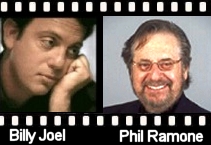 Maddie, on the other hand, is a pragmatist. And so, after considerable debate, she at some point in her adult life came to the conclusion that there was no God. And, what I found very interesting, and also very funny, is that that belief concerned David on Maddie's behalf. He was, in fact, terrified for her. And that's really where that episode came from. So from this internal debate I was having with myself about faith...then how do you do that on television? How do you make that palatable? How do you make it funny? And how do you make it Moonlighting? So, it sort of grew from that. That's a pretty good example but they're all different. One week Phil Ramone called me and he said, "Billy Joel's written this song and he wrote it with the show in mind; may I send it to you?" And he sent me this song, Big Man on Mulberry Street.
Maddie, on the other hand, is a pragmatist. And so, after considerable debate, she at some point in her adult life came to the conclusion that there was no God. And, what I found very interesting, and also very funny, is that that belief concerned David on Maddie's behalf. He was, in fact, terrified for her. And that's really where that episode came from. So from this internal debate I was having with myself about faith...then how do you do that on television? How do you make that palatable? How do you make it funny? And how do you make it Moonlighting? So, it sort of grew from that. That's a pretty good example but they're all different. One week Phil Ramone called me and he said, "Billy Joel's written this song and he wrote it with the show in mind; may I send it to you?" And he sent me this song, Big Man on Mulberry Street.
Cindy: We didn't know that. He wrote it with the show in mind?
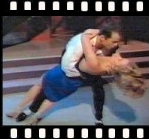 Glenn: Yeah. And I heard this song, and I immediately thought, "We have to do something involving dance. I had always wanted to do storytelling through dance. I was just always interested in that. And I serendipitously called Stanley Donen, who I think is one of the great American film directors. He directed Singing in the Rain, and On the Town, and all these great musicals with Gene Kelley, and also worked with Fred Astaire. In fact, he choreographed Fred Astaire on Broadway starting at the age of 16. Just an amazing man, and I said, "Would you do this?" And I was able to hornswoggle him into doing that, and then realized that we had to come up with a story to support the dance. And so that episode grew out of that. And also, I had this monologue lying around that I had written years before for a completely different project that I always wanted to use. And I remember using it in that show. It's that long monologue that David has when he talks about his wife.
Glenn: Yeah. And I heard this song, and I immediately thought, "We have to do something involving dance. I had always wanted to do storytelling through dance. I was just always interested in that. And I serendipitously called Stanley Donen, who I think is one of the great American film directors. He directed Singing in the Rain, and On the Town, and all these great musicals with Gene Kelley, and also worked with Fred Astaire. In fact, he choreographed Fred Astaire on Broadway starting at the age of 16. Just an amazing man, and I said, "Would you do this?" And I was able to hornswoggle him into doing that, and then realized that we had to come up with a story to support the dance. And so that episode grew out of that. And also, I had this monologue lying around that I had written years before for a completely different project that I always wanted to use. And I remember using it in that show. It's that long monologue that David has when he talks about his wife.
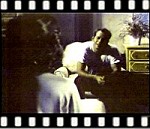 Diane: In the hotel room?
Diane: In the hotel room?
Glenn: In the hotel room. So it's just a compendium of things. They all come from different places. I remember Debra Frank and she had a wonderful writing partner, Carl Sautter. Came in and they wanted to do something having to do with old movies, and I think that was as developed as the idea came. I wanted to do something�.. I'd been hankering to do something in black and white. And not only did I want to do it in black and white, I wanted to do it -- God, was I a pretentious ass? -- in two styles of black and white. 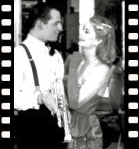 I wanted to do the Warner Brothers style of sort of gritty black and white, and the MGM sort of high gloss black and white. And we put our heads together, and came up with The Dream Sequence Always Rings Twice. At the last minute, ABC said, "You can't film in black and white. You need to film in color; we'll take the color out of it when we broadcast it." and I said, "There's no way in hell I'm going to do that. I don't trust you guys at all." So we ended up filming it in black and white, which at the time was a pretty gutsy thing to do. Now everybody does it, but back then, nobody was doing it, and in fact, we had a hard time finding film stock. With the exception of Scorcese in Raging Bull, a couple of years earlier, nobody had been photographing in black and white for a long time, and nobody would develop it for us.
I wanted to do the Warner Brothers style of sort of gritty black and white, and the MGM sort of high gloss black and white. And we put our heads together, and came up with The Dream Sequence Always Rings Twice. At the last minute, ABC said, "You can't film in black and white. You need to film in color; we'll take the color out of it when we broadcast it." and I said, "There's no way in hell I'm going to do that. I don't trust you guys at all." So we ended up filming it in black and white, which at the time was a pretty gutsy thing to do. Now everybody does it, but back then, nobody was doing it, and in fact, we had a hard time finding film stock. With the exception of Scorcese in Raging Bull, a couple of years earlier, nobody had been photographing in black and white for a long time, and nobody would develop it for us. 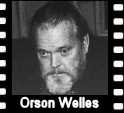 We finally had to make a special arrangement with a different lab, and then ABC just became very concerned about broadcasting something in black and white. Would the public be upset or would they think their sets were broken? All that silly stuff. These were serious concerns for them. So, I called Orson Welles and said, "Would you be interested in doing this introduction to the show, and he said, "I don't know, would you send me a copy of what it is I would have to say." So I quickly wrote this thing up and sent it to him and he was really tickled with it...it was funny, and he came over and did this, which was and still is one of the highlights of my life, that he came over and did this thing.
We finally had to make a special arrangement with a different lab, and then ABC just became very concerned about broadcasting something in black and white. Would the public be upset or would they think their sets were broken? All that silly stuff. These were serious concerns for them. So, I called Orson Welles and said, "Would you be interested in doing this introduction to the show, and he said, "I don't know, would you send me a copy of what it is I would have to say." So I quickly wrote this thing up and sent it to him and he was really tickled with it...it was funny, and he came over and did this, which was and still is one of the highlights of my life, that he came over and did this thing.
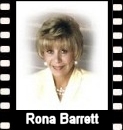 But, my point here is, a whole bunch of different input creates an episode. Sometimes they're products of necessity. We went through a period where we were having a very tough time finishing a show, for a whole variety of reasons. And in fact, we very often didn't know if we'd have a new show or not on a given Tuesday until a day or two before, whether we would literally be able to finish the show or not. And I was at an industry event in Beverly Hills. And when it was over, I was waiting on what they call the valet line, where you pick up your car, you know; you have to get your cars parked. And while I was waiting on this line with my wife, 20 or 30 people ahead of us, I saw Rona Barrett, who was THE premier show biz reporter, gossip columnist...I don't know what the nomenclature is anymore, but she was it.
But, my point here is, a whole bunch of different input creates an episode. Sometimes they're products of necessity. We went through a period where we were having a very tough time finishing a show, for a whole variety of reasons. And in fact, we very often didn't know if we'd have a new show or not on a given Tuesday until a day or two before, whether we would literally be able to finish the show or not. And I was at an industry event in Beverly Hills. And when it was over, I was waiting on what they call the valet line, where you pick up your car, you know; you have to get your cars parked. And while I was waiting on this line with my wife, 20 or 30 people ahead of us, I saw Rona Barrett, who was THE premier show biz reporter, gossip columnist...I don't know what the nomenclature is anymore, but she was it. 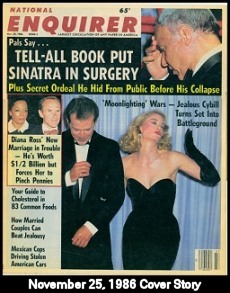 She was on Good Morning America every morning telling all of America what was happening in her column. And she's a lovely woman. She's about 4 feet 6 inches, she's a tiny little woman. And I saw her, and I was just amused as hell that she was standing on this line, and I said to my wife, "Excuse me." And I went up the line and I went over to Rona Barrett who I'd never met before, and I said, "Would you like to be on Moonlighting?" And she said, "What are you talking about?" And I said, "Can you be at 20th Century Fox tomorrow morning?" She said, "Sure." And we made up all this material that allowed us to use, I guess it was about 30 minutes of clips from older shows, but presented as sort of a new thing, because we were on the front page of The Enquirer, pretty much every week at that point. There was all this gossip about Cybill and Bruce not getting along, and Russia and America not getting along. It was just amazing stuff, so we thought, lets speak to it, let's just speak to it. And so we did an episode I really like called The Straight Poop, which was bracketed by Rona saying she was going to give us the straight poop on, you know, all this tension between Bruce and Cybill. And then we ended the show and I think, again, that if it wasn't the first time, it was certainly one of the early times that people saw this kind of thing. We took every blooper that we could find and just tacked it on and made it the last three minutes of the show. And that got a bigger reaction than almost anything we'd ever done.
She was on Good Morning America every morning telling all of America what was happening in her column. And she's a lovely woman. She's about 4 feet 6 inches, she's a tiny little woman. And I saw her, and I was just amused as hell that she was standing on this line, and I said to my wife, "Excuse me." And I went up the line and I went over to Rona Barrett who I'd never met before, and I said, "Would you like to be on Moonlighting?" And she said, "What are you talking about?" And I said, "Can you be at 20th Century Fox tomorrow morning?" She said, "Sure." And we made up all this material that allowed us to use, I guess it was about 30 minutes of clips from older shows, but presented as sort of a new thing, because we were on the front page of The Enquirer, pretty much every week at that point. There was all this gossip about Cybill and Bruce not getting along, and Russia and America not getting along. It was just amazing stuff, so we thought, lets speak to it, let's just speak to it. And so we did an episode I really like called The Straight Poop, which was bracketed by Rona saying she was going to give us the straight poop on, you know, all this tension between Bruce and Cybill. And then we ended the show and I think, again, that if it wasn't the first time, it was certainly one of the early times that people saw this kind of thing. We took every blooper that we could find and just tacked it on and made it the last three minutes of the show. And that got a bigger reaction than almost anything we'd ever done.
So that's really it. The show sort of came from, I used to call it stream of consciousness writing, because we were always so late. But I was so determined to keep the shows fresh and to keep them -- again, this sounds very pretentious-- but to keep them honest to the characters, and sometimes that meant sort of waiting for inspiration. And inspiration can come from, you know, crazy places. People make suggestions. 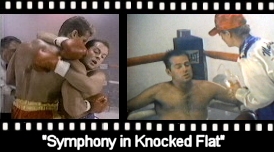 Some of it was nonsensical stuff, you know, like Bruce and I always kidded around about doing a boxing show because we'd always been big admirers of like, The Three Stooges boxing, Abbott and Costello boxing, Martin and Lewis boxing. So we just sort of put it on a list of things we knew we were going to do. I think we always promised each other we'd do a Western, which we never really got around to doing. The musical thing we did. The black and white thing we did.
Some of it was nonsensical stuff, you know, like Bruce and I always kidded around about doing a boxing show because we'd always been big admirers of like, The Three Stooges boxing, Abbott and Costello boxing, Martin and Lewis boxing. So we just sort of put it on a list of things we knew we were going to do. I think we always promised each other we'd do a Western, which we never really got around to doing. The musical thing we did. The black and white thing we did.
Shakespeare was a very obvious one because, for me, the emotional inspiration of the show always was The Taming of the Shrew. 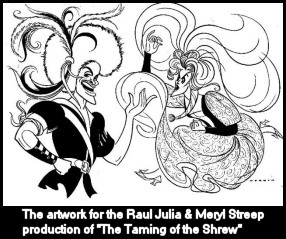 My wife had been in a production of Taming of the Shrew in college; I must have seen it 8 times. And then when we got out of school, Raul Julia and Meryl Streep did a legendary production of it here in Central Park, which I saw two or three times. So, for me, you know, Moonlighting was sort of a rip-off of "Taming of the Shrew," and always was. I've been trying to keep that a secret, you know. I actually spent a great deal of time working with Will Shakespeare. We wrote together for a long time. He, unfortunately, couldn't pull his weight, so we broke up, but... So that's sort of where "Atomic Shakespeare" came from, cause we just always, it was something we always wanted to attend to, you know?
My wife had been in a production of Taming of the Shrew in college; I must have seen it 8 times. And then when we got out of school, Raul Julia and Meryl Streep did a legendary production of it here in Central Park, which I saw two or three times. So, for me, you know, Moonlighting was sort of a rip-off of "Taming of the Shrew," and always was. I've been trying to keep that a secret, you know. I actually spent a great deal of time working with Will Shakespeare. We wrote together for a long time. He, unfortunately, couldn't pull his weight, so we broke up, but... So that's sort of where "Atomic Shakespeare" came from, cause we just always, it was something we always wanted to attend to, you know?
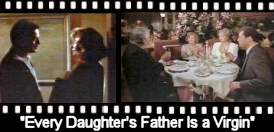 "Every Daughter's Father is a Virgin" a perverse idea that I had -- that wouldn't it be interesting, you know, that kind of stuff. And other people, it sounds like I thought of everything, and I didn't. Other people made suggestions, but it's 15 years ago. Frankly, I can't remember with any certainty and I wouldn't want to make a mistake. But, we had an amazing group of people. You know, not just the actors, and the actors were amazing, but, I mean, Allyce and Curtis and obviously Cybill and Bruce. But also wonderful writers who would come up with, you know, these insane notions -- Roger Director and Chick Eglee and Ron and Jeff and Karen Hall and Barbara Hall, and Kerry and Ali. It's interesting to see where people, you know, like, Kerry Ehrin used to be partners with a woman named Ali Matheson, who's actually the daughter of a wonderful science fiction writer. A famous science fiction writer. They would come up with these wonderful nutty notions. She's now writing for RugRats. There are a lot of RugRats cartoons. I mean, it's just interesting, you know. I have very fond memories of all these people, and of the experience. We were all very young. We were all very excited. We were all very stupid. And that was a great combination, you know because we were really sort of capable of doing anything. Because we weren't smart enough to know what was impossible.
"Every Daughter's Father is a Virgin" a perverse idea that I had -- that wouldn't it be interesting, you know, that kind of stuff. And other people, it sounds like I thought of everything, and I didn't. Other people made suggestions, but it's 15 years ago. Frankly, I can't remember with any certainty and I wouldn't want to make a mistake. But, we had an amazing group of people. You know, not just the actors, and the actors were amazing, but, I mean, Allyce and Curtis and obviously Cybill and Bruce. But also wonderful writers who would come up with, you know, these insane notions -- Roger Director and Chick Eglee and Ron and Jeff and Karen Hall and Barbara Hall, and Kerry and Ali. It's interesting to see where people, you know, like, Kerry Ehrin used to be partners with a woman named Ali Matheson, who's actually the daughter of a wonderful science fiction writer. A famous science fiction writer. They would come up with these wonderful nutty notions. She's now writing for RugRats. There are a lot of RugRats cartoons. I mean, it's just interesting, you know. I have very fond memories of all these people, and of the experience. We were all very young. We were all very excited. We were all very stupid. And that was a great combination, you know because we were really sort of capable of doing anything. Because we weren't smart enough to know what was impossible.
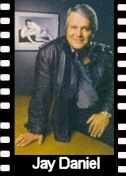 Also, there was a guy named Jay Daniel who was the line producer, the physical producer of the show. And he was extraordinary. He put up with an amazing amount of nonsense from me. Because more often than not, we didn't have a script. And he'd say to me, "What are we going to do on this show?" so that he could prepare. I'd say, "I don't know, but it's going to end in a pie fight." And he'd say, "Well, where is this pie fight going to be, Glenn? I have to get a location." I'd say, "It's going to be in a hotel ballroom. And I had no idea. I was making this up.
Also, there was a guy named Jay Daniel who was the line producer, the physical producer of the show. And he was extraordinary. He put up with an amazing amount of nonsense from me. Because more often than not, we didn't have a script. And he'd say to me, "What are we going to do on this show?" so that he could prepare. I'd say, "I don't know, but it's going to end in a pie fight." And he'd say, "Well, where is this pie fight going to be, Glenn? I have to get a location." I'd say, "It's going to be in a hotel ballroom. And I had no idea. I was making this up. 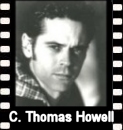 And he would go get, I mean he was just wonderfully facile and put together a terrific crew. There's a guy named Chris Howell, who was our stunt coordinator. We had a lot of really funny stunts. And funny stunts are hard; because not only do they have to be dangerous, but they have to be funny, and Chris was quite something. And his son, who was a teenager at the time was C. Thomas Howell. Tommy would do a lot of the stunts. He'd double Bruce. He'd double this one; he'd double that one. It was really a family, and we had great fun.
And he would go get, I mean he was just wonderfully facile and put together a terrific crew. There's a guy named Chris Howell, who was our stunt coordinator. We had a lot of really funny stunts. And funny stunts are hard; because not only do they have to be dangerous, but they have to be funny, and Chris was quite something. And his son, who was a teenager at the time was C. Thomas Howell. Tommy would do a lot of the stunts. He'd double Bruce. He'd double this one; he'd double that one. It was really a family, and we had great fun.
Continue to next page-->>>>


